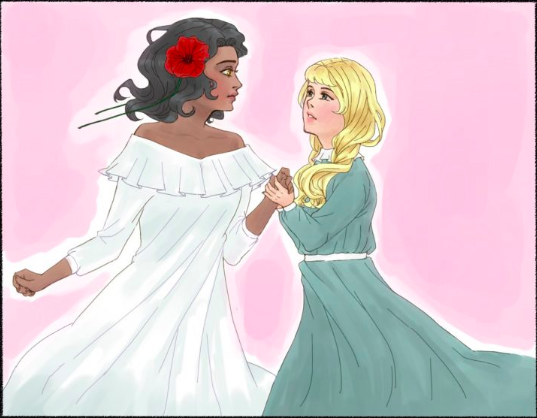graphics by Carmen Ngo
In the civilized countries there are no witches left, nor wizards, nor sorceresses, nor magicians. In the civilized countries there are no towns delicate as china, nor cities made of jewels. In the civilized countries there are no armies of pretty faces and knitting needles, nor wild beasts with grace and manners, nor boys who turn into princesses wearing flowers and gauze.
But, you see, the Land of Oz has never been civilized.
On a warm, pleasant day, which had been spent half attending to important affairs of ruling and half doing nothing at all, Ozma suggested to Dorothy that they should go on a journey together to a corner of her kingdom that they had not yet visited. “After all,” she said, “it has been a curiously long time since our last adventure, and I am not used to so much quiet!”
Ozma was the Ruler of Oz, and though she looked like a young girl she was widely considered to be the fairest and the kindest Ruler the country had ever had. Dorothy Gale had once been a little Kansas girl, but was now a Princess of Oz and Ozma’s constant companion.
“We shall make it a whole procession,” said Ozma decidedly, “and we’ll invite anyone who wants to come along. And you must bring your aunt, for she has seen so little of the beautiful country for all her time here.”
“I’m sure she’d be glad of the trip,” agreed Dorothy.
“You know, my dear, it’s very strange, but she continues to be a mystery to me. That is, I always find her a touch odd when we speak, and I never know why. Perhaps it is because she isn’t from Oz to begin with—but then, neither are you. You must tell me more about your Kansas!”
“There isn’t much to say ‘bout it,” replied Dorothy. “Least, not that I haven’t already told you.”
“But you’ve told me so little,” said Ozma. “I know of your farm, and your fields, and your cyclone cellar. But here in Oz you have travelled from one side to another, and you have brought back so many stories that you must know my own kingdom better than I do!”
“That’s dif’rent,” said Dorothy. “Oz is very new and queer to me. You know I grew up on the prairie, where everything was gray. You could travel for miles across that country and still see everything looking the same, but you can’t go more than ten feet in Oz without meeting someone stranger an’ stranger.”
Dorothy was ten years old, sitting on the broad Kansas prairie, and had just found Aunt Em softly crying while Uncle Henry tried to comfort her. Then Dorothy asked them to tell her what was the matter. They had not told their niece the sad news for several days, not wishing to make her unhappy, but now they told her how desperately poor they were, how they were about to lose the farm and the house, how uncertain they were of food. The girl listened quite seriously.
“Do you suppose you could manage to return to your fairyland, my dear?” asked Aunt Em.
Uncle Henry shook his gray head doubtfully. “These things all seem real to Dorothy, I know; but I’m afraid our little girl won’t find her fairyland just what she had dreamed it to be.”
They were uneasy, for this is a practical humdrum world.
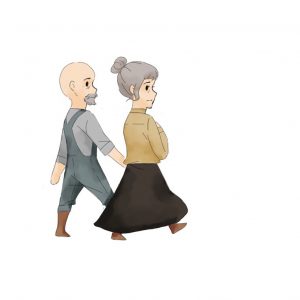
Every morning, they stopped for Bill, the Yellow Hen, to lay her daily egg. Aunt Em waited impatiently to collect it, an old habit of hers from living on a farm
“I can’t und’rstand why she won’t let me put the ‘eena’ on the end” declared Dorothy earnestly to her friend as they stood to the side. “Surely ‘Billina’ is a prettier name than ‘Bill’ anyway.”
“Oh, it isn’t any concern of yours,” said Ozma carelessly. “And if it’s such an easy name to change, perhaps there’s really no difference between them.”
“But it’s all wrong, you know.”
Ozma looked sternly at the Kansas girl. “Really, Dorothy, that’s a rude thing to say about anyone’s name.”
Dorothy, as even her friends had to admit, had one notable deficiency in speaking, which was that she did not often think before she did it. She felt rightly embarrassed by that now, however, and tried to mend matters by explaining, “It’s just that all the Bills I know have been b—”
“—have lived in Kansas, not in Oz. Perhaps you find her name unusual, Dorothy, but everything in life is unusual until you get accustomed to it.”
“I s’pose so,” replied Dorothy with her pride a little bruised, for she did not like arguing with her friend.
“After all,” said Ozma, “is Billina a girl?”
“No-o-o,” said Dorothy, “she’s a yellow hen.”
“Then perhaps it is best left to a yellow hen to decide what name is right for a yellow hen.”
In the Country of the Gillikins, which is at the North of the Land of Oz, lived a youth called Tip. This boy remembered nothing of his parents, for he had been brought quite young to be reared by the old woman known as Mombi. Tip was made to carry wood from the forest, that the old woman might boil her pot. He also worked in the corn-fields, hoeing and husking, and he fed the pigs and milked the four-horned cow. So, he grew as strong and rugged as a boy may be.
But Mombi was not a good guardian. She indulged in the magical arts, though the Good Witch had outlawed it. Tip thought she was a terrible old woman, for often her cruelty made him shudder, and he frankly hated her.
And so he ran away. As he journeyed down the road of yellow brick, Tip turned his thoughts to the people and history of the land of Oz. He knew that there had once been a girl who had come here from Kansas, a place in the big, outside World. Dorothy Gale had journeyed to the Emerald City and found her way home.
Perhaps, Tip thought, if he made the journey, he would find the same.
Ozma’s party stopped to refresh themselves at a ranch. Next to the road was a lovely little ranch-house, neatly painted, with sparkling windows and a tidy path. A girl was sweeping the front porch with such energy that no speck of dirt would have stood a chance. At Ozma’s call, she stopped in her task and came over to drop a low curtsy before the chariot. “Your Highness, I’m very honored by your visit.”
“This is Jinjur,” said Ozma politely to Dorothy’s aunt, who had never met the pretty dairy-maid before. “She’s a good girl, honest and sensible. She once assembled an army of women and drove the Scarecrow from the throne of the Emerald City and fought a battle with the powerful army of Glinda the Sorceress, but now she owns nine cows and is happy and contented to lead a quiet life and mind her own business.”
“That sounds likely,” said Aunt Em.
Jinjur prepared a very pleasant meal of bread and milk for the travelers, who were glad of the refreshment. While they ate, she sat with them and made cheerful conversation.
“Where are you headed?” she asked when it was time to tidy up, and, upon hearing Ozma’s answer, continued, “I’d like to travel with you, if you don’t mind. It’s been years since I’ve done anything so regal as ride in a chariot, and you know how I love regal things.”
“I have no objection,” said Ozma, “but what about your husband?”
“What husband,” replied Jinjur, calmly.
Ozma asked no more questions, and the party moved on again.
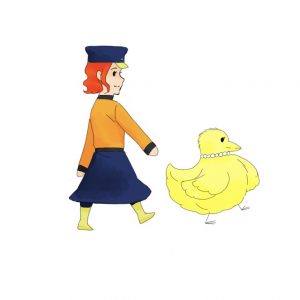
Ozma had journeyed across Oz twice before. She had traveled by foot both times.
When Ozma heard that there was a girl being held prisoner in a tower, and that the girl’s name was Dorothy Gale, she called immediately for her golden chariot, a great Lion and an immense Tiger, her ivory staff of glistening diamonds, and a company of twenty-seven soldiers.
The next morning, Dorothy looked out from the tower and saw a broad green carpet unrolling itself upon the desert, while advancing across the carpet was this wonderful procession. She guessed at once that the lovely driver of the chariot must be Ozma of Oz.
“Why did the Princess lock you up, my dear?” called Ozma from her chariot. “I will see your captor at once, and liberate you.”
Dorothy knew, as soon as she heard the sweet voice of the girlish Ruler of Oz, that she would soon learn to love her dearly.
When it was time to rest for the night, Ozma selected a smooth, grassy spot, waved her wand in graceful curves, and chanted some mystic words in her sweet voice. In an instant a village of handsome tents appeared before them.
“Come, dear,” said Ozma, taking Dorothy’s hand and entering one of the tents.
There they found beds with satin sheets, warm blankets, and pillows filled with swansdown. Low lamps lighted the interior of the tent with a soft, rosy glow. The tent was beautiful, but small, smaller than any room in Ozma’s palace. Dorothy looked around the space with her heart pounding.
“Say, Ozma,” she said in a low, unsure voice. “Don’t you ever get scared?”
Ozma looked up from the pillow she was fluffing. “Whatever do you mean?”
“Well, I’ve always been rather fright’ned of small places like this. Not—not right now of course,” she added as she felt her friend’s small hand reach quickly for her own. “I’m quite all right here with you.”
“There are a number of things that quite frighten me, my dear,” said Ozma in a low, serious voice. It’s a heavy duty being Ruler of Oz, you know, and things need to be done just right in order to be done at all. There are many times when I know I must say a certain thing to someone and, though I know it isn’t dangerous, I am anxious about the result.”
“I think you do a great job,” said Dorothy resolutely.
“And I thank you very much for that, but remember that you have always known me as a Princess, whereas in truth I was crowned only shortly before I met you, and am nearly as clueless as you are.” Ozma’s breath seemed suddenly shaky. “You have no parents, my dear?”
“I’m an orphan.”
“I grew up on a farm, like you. You had your Aunt Em, who loved you very much and worked so hard to provide for you. Mombi was…” Ozma paused. “Nothing like that.”
She was quiet for a second more, and then burst out:
“Oh, Dorothy—I hated that old obstinate witch!”
Those words, coming from the delicate fairy girl’s pretty lips, jarred Dorothy. Never had she heard this strand of anger in Ozma’s voice, and it struck her suddenly that the Ruler of Oz must have much to hide. On a whim, she darted forward to put her arms around Ozma and pull her close into a hug. “Ozma! I won’t tell, I swear.”
Ozma replied nothing, but they were quite close enough that Dorothy could sense her trying to smile.
Dorothy was much interested in the story of Ozma.
“The former King of this City, who was named Pastoria, lost the crown to the Wonderful Wizard. Pastoria had a daughter, who was the rightful heir to the throne of the Emerald City. The usurping Wizard brought the girl Ozma, who was then no more than a baby, to Mombi, and begged her to conceal the child. Mombi transformed her—into a boy.”
Dorothy was much interested in the story of Ozma.
“When the Ruler, my grandfather, was hunting one day, one Wicked Witch named Mombi stole him and carried him away, keeping him a close prisoner. She was my grandfather’s jailor, and afterward my father’s jailor. When I was born she transformed me into a boy, hoping that no one would ever recognize me and know that I was the rightful Princess of the Land of Oz. But I escaped from her and am now the Ruler of my people.”
Dorothy was much interested in the story of Ozma.
“Oz was not always a fairyland. It was shut in by a dreadful desert of sandy wastes that lay all around it, thus preventing its people from all contact with the rest of the world. Seeing this isolation, the fairy band of Queen Lurline, passing over Oz while on a journey, enchanted the country. And Queen Lurline left one of her fairies to rule this enchanted Land of Oz, then passed on and forgot all about it. My authority comes from the Fairy Queen Lurline, of whose band I was a member. What and who I am is well established.”
“What about Mombi?” Dorothy asked.
“What Mombi,” replied Ozma, quietly.
Oftentimes, Dorothy wished she could know the story of Ozma.
The travellers stopped for a picnic on a grassy slope, and Aunt Em made herself busy spreading out the blue-checked picnic blanket into a neat square while the others searched for a basket of food. She made quite a contrast against the vibrant landscape, for she was a very colorless sort of woman. Kansas had taken the sparkle from her eyes and the red from her cheeks and lips, making her thin and gaunt. It was a kind of grayness that could not be changed even by the magic of a fairyland.
Still, she was cheerful as her niece approached with several friends and they arranged themselves in a circle to eat.
“This is a lovely picnic,” she said. “Who made it?”
“It was provided,” said Jinjur.
“The people in Oz are always providing for each other,” explained Ozma. “Each man and woman is supplied by their neighbors with food and clothing, and a house, furniture, ornaments, and games.”
Aunt Em was left feeling quite bemused by the strange system. “You do things differently here than in Kansas, that’s all I can say,” she said eventually, “and I just hope you’ll have patience with all my misunderstandings for some time.”
As they ate, they discussed an incident that had occured on the previous day of travel. The party had been attacked, and the attacking beasts vanquished.
“You fought well,” Jinjur complimented Bill; she had become quite good friends with the Yellow Hen over the course of this trip. “It does my heart good to have been in a good fight once again; the ranch can get so terribly monotonous.”
“I know that’s true about ranches,” said Aunt Em. “Still, I don’t think fighting is the best diversion. Isn’t it rather… undig’n’fied?”
“I don’t see what’s so dignified about letting some speckled villain lord it over me, when there’s no right or reason,” countered Bill gruffly.
“But I must agree,” Ozma broke in. “Fighting ought to be a last resort, not a pastime.”
Jinjur took a sip of tea. “You got an entire army to dethrone me.”
“Glinda’s girls did an excellent job avoiding battle.”
“Excuse me—” Aunt Em interrupted. “Glinda’s girls?” She had been surprised enough to hear about Jinjur’s army of women, but a second army of women was simply unfathomable.
“Of course,” said Jinjur, rather surprised. “Glinda is a very wise and powerful witch, and would never keep an army whose constitutions are as weak as men’s.”
“You mustn’t be so s’prised at everything, Aunt Em,” Dorothy rushed to say. “Remember you’re not in a civilized country any more.”
“I’m personally glad of the fact,” declared Bill. “Civilized countries are too full of cocks for a hen like me.”
This was something on which everyone could agree.
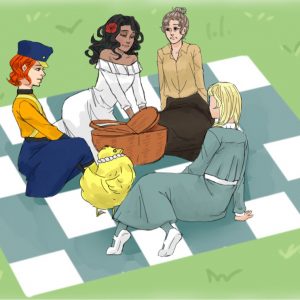
The next time the travelers stopped for a rest, Ozma caught Dorothy’s hand and pulled her toward a stand of flowering trees on top of a nearby hill. Dorothy laughed at first, expecting some new sight or adventure, but then she caught a glance of her friend’s expression.
“There are other things which frighten me,” Ozma began suddenly, as if they had never stopped talking the previous night. She clasped her friend’s hands and held them in her own between their hearts.
“Like what?”
The Princess didn’t reply, but planted a quick kiss on Dorothy’s fingers.
For several minutes, there was silence except for the rustle of the summer wind across hills and through trees. Looking down at their traveling party, Dorothy could see the road of yellow brick winding back the way they came, tracing back to the faint glow of the Emerald City in the distance. In the other direction, the pink flowers and grasses blended into blue farmland, and the road cut across toward the horizon.
“See now,” Ozma said. “I’ve kissed you a hundred times before your aunt and uncle, or in the middle of my court, now haven’t I? It ought not to scare me anymore.”
“Of course not,” said Dorothy, in such a tone of voice that Ozma couldn’t tell what her reaction was.
Tentatively, she kissed her hands again.
Dorothy giggled. “What are you doing?”
“Don’t laugh at me,” Ozma scolded, perhaps a little more sharply than she meant to.
That only made Dorothy smile more. Ozma was always so petulant now that she was accustomed to always having her own way. “I didn’t mean to.”
If Dorothy had the deficiency of not speaking before she thought, it must also be said that she too often did not think at all—at least, not too thoroughly about things that were right in front of her. This had served her well in some ways, as no over-thinker could possibly travel across a fairyland without stopping every few feet to cry, “but this is impossible!” But Dorothy had travelled far and wide across the Land of Oz and had met many strange people and seen many queer goings-on without overusing her faculty of surprise. Few things struck this young girl as queer anymore.
It didn’t strike her as queer when Ozma leaned in very close to her under that beautiful, flowering tree.
Nor did it seem queer when she touched Dorothy’s chin with the delicate fingers of one hand or rested the other on the farm girl’s shoulders.
Nor did it seem queer when her lips touched Dorothy’s as they had done a hundred times before.
It was only after the kiss had lasted several seconds longer than Dorothy was used to that she uttered a surprised “Oh!” and pulled away.
“My dear?” said Ozma.
“Oh!” cried Dorothy again.
Ozma stepped slightly back. Her voice was uncharacteristically tremulous as she asked,
“Was I right to be afraid, then?”
“No—” said Dorothy with a smile. “I’m rather shy myself.” And then, quite in spite of herself, she let out a snort of laughter.
Aunt Em hurried to adjust her dress and her bonnet as the Princess Ozma approached her, then dropped into a deep curtsy.
“Please,” said the young girl, “you are among my friends now—there is no need to do that.”
“I’m not going to put on airs at my time of life, you know.”
“You may as well,” said Ozma. “Your own niece is a Princess of Oz! But if you think that is a small matter, then know that she is also my chosen companion in life. I was so happy when she at last agreed to come to my palace and live there always! She never would come, out of loyalty to you; she loves you so.” With this, she reached for the woman’s hand. “Because Dorothy loves you, I love you, and I hope you will allow me to think of you as my own Aunt, for I have never had a family to love.”
“But of course,” said Aunt Em, who like no other kind-hearted woman could resist so earnest a plea. She embraced Ozma, then watched with wonder as the Princess made her way to Dorothy. There was a quiet joy she couldn’t express as she watched the gentle way Ozma took Dorothy’s hand, but there was a quiet kind of fear there as well. She remembered the days when she herself had been a young, pretty wife, and recalled too the days that she had screamed at a child’s laughter.
But that had been in Kansas, and one dealt with children and with husbands as best one could. Now Aunt Em slept in her own bed and wore bright silk dresses and her days were unnumbered.
And what did it matter if she couldn’t understand the excited way that Ozma led Dorothy about by the hand, or the awestruck tone in which Dorothy praised Ozma’s beauty and wisdom, or the loving kisses the two exchanged when they thought no one was looking? It would all be unheard of back in Kansas. But this was Oz, and it was an uncivilized world.
Dorothy was twenty years old. It had been ten years since she first set foot on the road of yellow brick. She had kept count of the birthdays she had celebrated and the candles she had blown out, and she made sure that one candle was added every year, as was proper.
Dorothy did not look like she was twenty years old, nor did she look like she was fifteen, nor did she look like she was ten. Dorothy’s years were unlimited in the Land of Oz, and her face reflected it. Oftentimes this made her aunt uneasy to look at her, for Em was still set in her ways.
The travelers knew that they would be welcomed wherever they might go in the Land of Oz, and that the people would feed and lodge them with genuine hospitality. So at about noon, they began to search for a homestead or a small farm-house where they might be given a delicious luncheon and rest a while.
But it had been a long time since they had passed any dwellings. The country was very pretty around them, with neat fences at the sides of the road, painted a dainty blue color, and beyond them fields of grain and vegetable in abundance. They came to the end of a cornfield—and it seemed to Dorothy that Ozma untensed, ever so slightly—and passed into a long stretch of road surrounded by wheat. “Soon enough we are sure to pass by the owner of this field,” Ozma said.
And it seemed the girl Ruler was not entirely wrong, for before long Dorothy gave a shout and pointed.
This house was rather different than the houses they had passed recently, which were each round, with a big dome for a roof, and painted blue. This one was very square, and made of wood that was dull and gray.
“It doesn’t look like a very friendly household,” said Ozma, “but that is no matter. Many things look like they aren’t a certain way, when in fact they are. Not to mention, quiet and loneliness can be very sad, so I have no doubt our lively presence will bring cheer to our hosts.”
It was very quiet and lonely as they approached the house. Dorothy took Ozma’s hand, and was conscious of her aunt walking behind her, but still the blueish landscape seemed very vast and the travelling party very insignificant.
Nobody came out to greet them, so Ozma went up to the door herself. The moment she knocked upon it, however, it swung open, having been long unlocked. Ozma pulled Dorothy in after her as she entered.
The house was small. There were four walls, a floor and a roof, which made one room; and this room contained a rusty looking cookstove, a cupboard for the dishes, a table, three or four chairs, and the beds. There was a big bed in one corner, and a little bed in another corner. There was no garret at all, and no cellar—except a small hole dug in the ground, and covered by a trap door in the middle of the floor.
From outside, Dorothy heard Aunt Em give a cry of recognition.
Ozma stood near the edge of the house, where she was mostly sheltered from the wind. From the doorway, Dorothy could see that the girl Ruler was gazing motionlessly out over the wheat fields. After some time, she went quietly over to her.
“I think my aunt will be inside for a while,” she said. “She’s thinking.”
Ozma turned to her friend with a grave face. “I thought that I had done away with all the bad places in the Land of Oz. It seems that job isn’t yet done.”
“I forgot that this old house was still here,” said Dorothy. “It seems odd that nobody’s done anything about it.”
“What would you like me to do about it?”
“Oh—you needn’t do anything. It’s only strange to have seen it again after so many years living in your palace.”
“To think,” said Ozma quietly. “I’ve always been so curious about where you came from, and now it seems to me it must have been something like this.”
“Something like this,” Dorothy agreed, “but not entirely; nothing could be quite like that gray prairie, and I’m glad of that. I was almost glad to forget it. I think to visit was a good thing, even if it hurt.” She paused, then, tentatively, asked, “Would you like to visit… where your farm—”
“No,” said Ozma shortly, turning back to face the wheat field.
Dorothy nodded. She slipped one arm around the other girl’s waist, and rested her head on her shoulder.
“This was an odd sort of adventure,” said Ozma after some time. “When we return to the Emerald City we ought to telegraph it to Mr. Baum as we do our other stories.”
“You know, I think he may not understand it. It’s rather an odd story. I don’t know if he’ll know what to do with it, for he is a civilized man.”
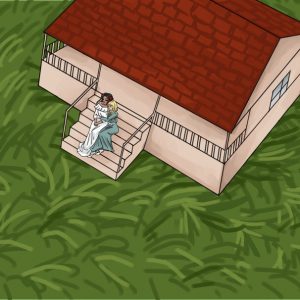
This story borrows characters, settings, plot points, and a large amount of word-for-word text from the Oz book series by L. Frank Baum. The books were published 1900 – 1920 and are in the public domain.
“Over the Rainbow” was first published in Disidentifications, OutWrite’s first creative writing anthology. Read the fully illustrated story on Issuu, then check out our past print collections!
Want to join our staff? Our applications are open NOW until OCTOBER 10, 2018.
- Writers
- Copy Editors
- Graphic Designers
- Photographers
- Social media

